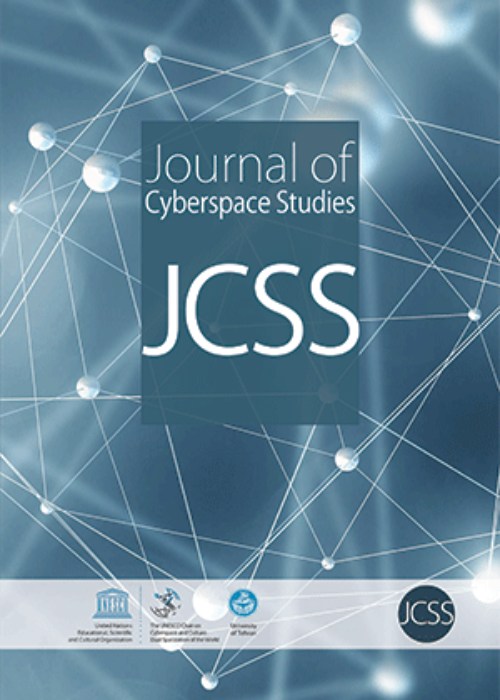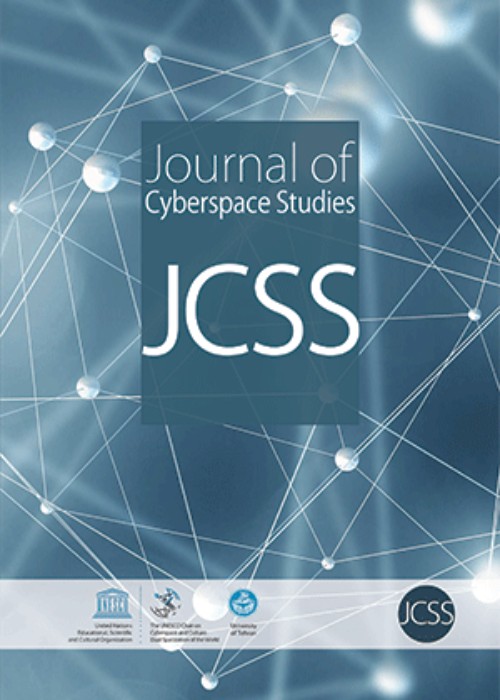فهرست مطالب

Journal of Cyberspace Studies
Volume:7 Issue: 1, Winter-Spring 2023
- تاریخ انتشار: 1402/05/07
- تعداد عناوین: 5
-
Pages 1-22One of the main features of open-world games is the non-linear process, the existence of multiple ways to achieve goals, the noticeable presence of cultural elements, the impact of the game space on world-famous cities, and the significant use of artificial intelligence. This research after examining the concept of "open world" in digital games and the development of this design model by using of case study and participant observation, with a critical and skeptical look at the realization of the game world of "Grand Theft Auto V and online version", especially in the context of the existence of multiple paths, seeks to achieve the main goals. The results of this study indicate that the open world of the game "Grand Theft Auto" is limited and enclosed by the design of the structure, storylines, characters, scenarios, rewards, punishments, racial discrimination, and sexual preferences. Despite the definition of normal and common professions and jobs in the game environment, such as buying and selling automobiles, investing in the stock market, medicine, working in the transportation system, and store management, the main goals are only through the income from membership in mafia groups, extensive trade in materials. Drugs and organized robberies are attainable, and role-playing in the position of the police is also associated with many obstacles and challenges, limited powers, few initiatives, a high degree of difficulty, and little attraction.Keywords: digital game, grand theft auto, open-world, Police, role-playing servers
-
Pages 23-44This study examined how young Nigerian internet users view social media use and cyberethics. This study included all secondary school-aged female Nigerians from the six geopolitical zones. Thirty-six females aged 13–15, the generation's median age, were chosen from each zone and state. The tool for data collection was an open-ended survey. The results revealed that young women used multiple social media platforms. The characteristics of the various social media platforms which showed minimal text, short videos, and photo-editing filters showed that their peers heavily influenced their use of social media. This study also found that Generation Z females believed that large number of online followers implied a high sense of self-esteem and that any activities that increased followership was acceptable. They also underestimated online risks. Female Gen Z posted sexually suggestive videos online due to peer pressure and the need for peer acceptance, showing a lack of awareness of the consequences of such conduct. The study recommended that schools and all organisations put in place policies to ensure positive use of the Internet. Similarly, the study also recommended modifications of school curricula to include cyberethical awareness. Parenting techniques should also adequately teach societal awareness and the risks of exposing children to early exposure to the Internet.Keywords: cyberethical behaviour, digital natives, female generation Z, gen Z, information behaviour, online followers, online safety, perception, Social media use
-
Pages 45-66Through an epistemological lens, this article asserts that the dawn of the internet of data (IoD) era marks a profound shift in our understanding of human existence, one that challenges the notion of modern man as a singular and distinct entity. Delving deeper, the analysis presents an ontological exploration of the transition from a human-centric approach of the 19th and 20th centuries to the added-value man of the 21st century, examining the ideological underpinnings of concepts such as the Information Society and Society 5.0 respectively as representatives of the above two insights. In particular, the article meticulously dissects the stance of each approach towards humanity, highlighting the paradigm shift in our perception of the human experience. This piece offers an insightful commentary on the evolution of our understanding of human nature, encouraging us to rethink our place in the rapidly changing digital landscape.Keywords: algorithmic personalization, Individualism, internet of data (IoD), Society 5.0
-
Pages 67-80It is generally perceived that serious games are more interesting to people who are more educated. But is this perception really true? This paper tries to answer this question and some other related questions to provide a clearer picture of who plays strategic games in the US. Data were taken from a large dataset of one of the PEWs surveys. The American Trends Panel is a probability-based online panel which is carried out nationally using a sample of adults in the United States living in households. This survey was fielded for the Pew Research Center by Abt Associates from April 4 to April 18, 2017. Overall, 4,168 participants completed the Wave 26 survey. The results found that in comparison with non-strategic gamers, strategic gamers are more likely to be men, more educated and wealthier, though the differences are small. It seems the old stereotypes about Sgamers and NSgamers should be re-evaluated, if we want to know how to use serious games for educational purposes.Keywords: Education, serious games, Socioeconomic Status, strategic games, survey
-
Pages 81-104
Cyber transgressions (nonnormative behaviors, attitudes and conditions)– both cultural and criminal– have raised social control concerns among different stakeholders. A group comparison research design was adopted to examine the effects of sociodemographic factors and social media use habits of Iranian social media users (n= 989) on their self-control, cybercultural transgressive behaviors, and transgressive content consumption. The study has contributed to the literature by recognizing the impacts of gender, age, relationship status, parental, educational, and occupational status, and household income level on the outcome variables. Altogether, it can be inferred from the results that individuals (especially women) who are older, married, have children, are middle-income, university educated, non-student, have more years of Internet use experience, and less daily internet use, and have a job (also retired individuals and housewives) are less likely than others to commit online transgressive behaviors, or consume transgressive content. The findings of this study can be employed to devise new policies and initiatives to socially control the cybercultural transgressions, without applying coercion.
Keywords: cyber social control, cybercultural transgressions, Self-Control, social media use habits, sociodemographics


